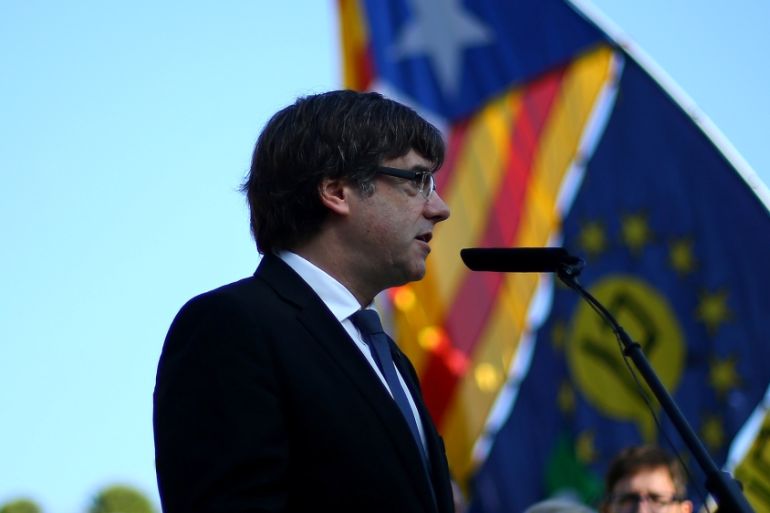Catalan leader refuses to clarify independence stance
Carles Puigdemont fails to says whether he declares Catalonia’s independence from Spain, urging dialogue with Madrid.

Barcelona, Spain – Catalan leader Carles Puigdemont has failed to clarify whether or not Catalonia plans to break away from Spain, and has instead called for talks.
Spain’s Prime Minister Mariano Rajoy had given Puigdemont until Monday 10am local time (08:00 GMT) to make his position clear and until Thursday to change his mind if he called to secede. Rajoy has threatened that Madrid would suspend Catalonia’s autonomy if Puigdemont chooses secession.
Keep reading
list of 4 itemsLarge protests against Catalan amnesty deal in Madrid after PM sworn in
Thousands protest against Catalan amnesty in Spain
Spain’s Sanchez set to stay PM after amnesty deal with Catalan separatists
In his letter to Rajoy on Monday before the deadline, published by Catalan media, Puigdemont did not directly answer yes or no to whether he is declaring independence, and said the two sides should meet “in spite of everything that has happened”.
He said the offer of dialogue is “honest and sincere”.
Puigdemont declared independence on October 10, then suspended the effects of the declaration after eight seconds, leaving the door open to dialogue with the central government in Madrid.
But those talks have not taken place.
Rajoy said he “profoundly” regrets that Puigdemont did not respond, saying the ultimatum was the first step in enacting Article 155, according to Spanish news agency Efe.
Deadline extension
Spanish Vice President Saenz Santamaria, in place of Rajoy who has travelled to northwest Spain to attend to raging wildfires, gave Puigdemont a three-day extension to clarify his position.
The Catalan leader now has until Thursday to clarify his stance. If he does not, Spain will enact Article 155, Santamaria warned.
Puigdemont “has an opportunity to rectify [the situation] in Congress, where he can explain with the utmost clarity, because dialogue is not demanded, it is practiced”, the vice president said.
Puigdemont gave the Spanish government a two-month period for dialogue concerning Catalonia’s independence.
The Spanish justice ministry said on Monday it does not consider Puigdemont’s letter as “valid” because it lacked clarity.
Article 155 allows the central government to take control of Catalonia’s regional government.
Referred to as the “nuclear option”, Article 155 has never been used before.
“Rajoy has the problem of having to appear as the strongman because this has been the theme of [his right-wing Popular Party] ever since Francoism,” Jordi Graupera, a Catalan political analyst and researcher at Princeton University, told Al Jazeera.
Rajoy’s Popular Party was founded by former ministers of Francisco Franco’s far-right, authoritarian government that ruled Spain from 1939 to 1975.
Franco outlawed minority culture and languages such as Catalan in an attempt to homogenise Spain.
Many in Catalonia still feel their culture is under threat due to the Popular Party’s “anti-Catalan” policies.
‘Diluting cultural difference’
Rajoy’s position to keep pushing Catalonia back is unsurprising, given that the Popular Party has for decades built a platform “that negates any possible legitimacy for Catalonia to be a political subject, and attempted to dilute all cultural difference”, said Graupera.
Catalans voted on October 1 to secede from Spain in a referendum that was marred by violence.
The Catalan government says 90 percent voted for independence, though many were blocked from voting by police raids and others abstained.
But some Catalans support remaining a part of Spain. They fear the risks of becoming a new state and say their cultures are similar.
Catalonia’s Popular Party President Xavier Garcia Albiol has called Puigdemont “unconscientious”.
The passing of Monday’s deadline extends a challenging process that began in earnest in September, when Puigdemont and his “Together for Yes” Catalan nationalist ruling coalition – along with the support of far-left Popular Unity Candidacy – passed a law for a binding referendum on independence from Spain.
Spain’s constitutional court ordered a suspension of the referendum the day after it was announced, following an appeal from the Spanish government which said the plebiscite would breach the country’s constitution.
Spain’s 1978 constitution decrees that the country is indivisible, and grants the national government exclusive power to hold referendums.